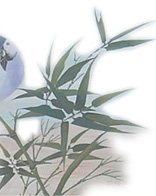|
|
|
 |
| |
|
|
|
[<<] [<] [>] [>>] |
| Title: Shirley's Art Works 1074 & Chinese Baimiao -59- Tricolour Amaranth -- My 109th Painting in the USA and the 34th Painting in my 6th American Travel Dec 31, 2015 - Jan 1, 2016 |
| Artist: Shirley Yiping Zhang |
| Size: 53.00cm x 26.00 cm ( 20.86inches x 10.23inches) Chinese Ink on the Shuxian Paper |
| Completed Time: Dec 31,2015 - Jan 1, 2016 |
Remarks:
This is My my 1074th Painting since 2003 and my 59th Chinese Bai Mao,my 109th Paintings in the USA and the 30th Painting in my 6th American Travel Dec 31,2015 to Jan 1, 2016.
I started this painting on Dec 31, 2015. I could not go forward when I painted for a while, because I did not know the details of the flower parts of the plant.
So, I stopped my work and to check data on the Internet. It was a pity for I could not find any photo which can let me see the flower part of the plant because its flowers are very small and grow under the "oxter" of the branches.
However, I do have found an interested story about this plant in Chinese culture.
A young boy and a young girl loved each other and prepared to get marry, but a local rich man wanted the girl to get marry his son. So, they worked with the local official and sent the young boy to work in a far away place and then to force the girl to marry the son of the rich man. The girl chose to kill herself by dashing against a tree. Then a plant grew up on her grave, which had a straight trunk branch and thick dense green leaves. The young boy knew the news and he was so sad that he was dead very soon and then he changed to be a wild goose and flew back his home. When the wild goose flew by the grave, quickly, the plant changed to be bright red. Just like she would like to tell the wild goose that she was just the girl who had been waiting for him back...
Since then, people has been called the plant "Yan Lai Hong" in Chinese, Yan means wild goose, Lai means come, coming, Hong means red. Yan Lai Hong means it will be red in the season that wild goose comes in the fall...
Then on Jan 1, I completed this Baimiao. Base on it, instead of painting it to be a Chinese Gongbi, I painted it to be a Chinese Mugo.
How do you think of the two paintings? Do you enjoy the colored one or the black and white one?
If you have any questions, comments or suggestions, you are welcome to write to shirley@ebridge.cn, you can also publish your opinions on Message Board . :-)
--Shirley Yiping Zhang
Jan 3, 2016
|
|
|
|
|
|
| |
| |
|

